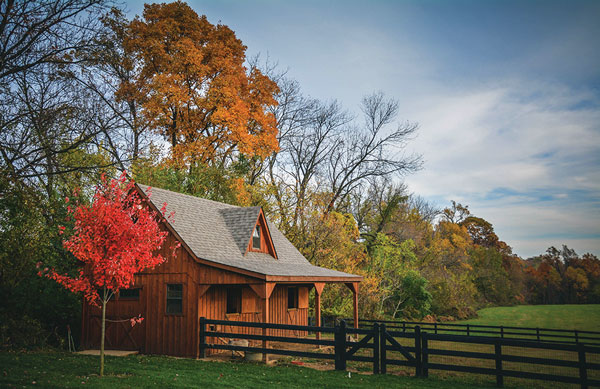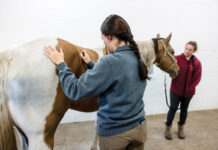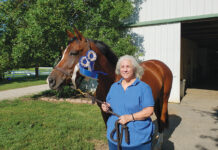
By Nikki Alvin-Smith, Horizon Structures
Clean the Barn from Floor to Rafter
The easiest method to clean down both the interior and exterior of a stable building is to use a Powerwash machine. These are actually fun to use and can save a lot of scrubbing of manure stains on walls by hand, especially if you were prudent enough to coat the wood surfaces with a sealant. Obviously avoid hitting electrical fixtures and outlets, and screens should be removed or protected from a harsh spray. If flyscreens are removable, then sponging them off with dish soap and water by hand is the best way to avoid damage to their fragile surfaces. If you don’t own a Powerwasher then your option is to rent one from a local box store or beg and borrow one from friends or family.
Be careful to use a cleaning agent that is safe around horses and that won’t damage metal surfaces. Dawn dish soap is effective and a favorite detergent that can be added to most machines and utilized without damage to building surfaces, but check with your building manufacturer to be certain.
Pay particular attention to flat surfaces, such as the top of dividing walls and rafters, and remove bird nests and insect nests on both the interior and exterior of the structure.
Once the building is clean, it is the perfect time to disinfect the stalls. Use a non-toxic product that is both safe for horses and other animals/pets and one that will kill both gram-negative and gram-positive bacteria. The former are often more difficult to remove, so ask your vet for suggestions for the best products to use if you are unsure.
Once the building is sprayed down, excess water can be picked up with the use of a Shopvac style wet vacuum. Don’t forget to change the filter from a dry to wet type before use!
All windows can be cleaned as insects should now be a non-issue, and grill bars can be sponged down to remove any grease build up.
Fire Hazards
All light fixtures and interior surfaces should be brushed free of cobwebs and dead insects in windows can be dry vacuumed away. A vacuum is a great tool as it won’t spread the dust and detritus everywhere. Be careful to remove all shavings/sawdust/straw or other flammable products from the stall or barn areas before plugging in or utilizing electrical equipment. If possible, plug all electrical equipment into a GFI (ground fault interrupted circuit) for extra safety, and if using extensions, be certain they are rated for the purpose.
This is a good time to check all locks and latches are secure, post an emergency contact board with phone numbers for fire/police/vets/hospitals in clear view, update any barn rules, and to clean any message boards to keep content current.
Fans should be cleaned thoroughly and stored for next year’s use.
If you plan to use any type of water heating system, check all appliances or equipment for wear and tear and replace any questionable units. Ensure that all fixtures to be used are secure and not within reach of inquisitive equine noses or their teeth.
Make sure you have fire extinguishers that are current and operable placed in high-visibility locations. For a center aisle or larger barn, use multiple units, and be sure to place at both ends of the barn and all entrances.
Tack Rooms
Soft furnishings, such as rugs/carpets and chairs/couches, can be removed and brushed clean or vacuumed. Tile surfaces can be scrubbed clean and a quick tidy up replacing summer sheets with heavier weight blankets will ensure you are ready for a change in the weather. Hopefully you had your blanket inventory washed and repaired at the end of Spring, but if not, time to get on it.
Tack should be cleaned and put away and also protected from freezing weather and moisture. Leather exposed to cold temperatures can crack, and excessive heat can dry leather out, so choose a well-ventilated location and make sure the tack is ‘fed and watered’ before storage with an appropriate oil or soap.
Protect Your Potions and Lotions
Fly sprays and other products can become chemically changed to their detriment if subjected to freezing temperatures. It is wise to remove all liquids, potions, liniments, etc. from storage areas that may freeze and store them in a heated area.
Medical kits should be updated with fresh emergency supplies and stored in a handy spot that is also protected from freezing. It is imperative that all medical supplies such as tranquilizers, antibiotics and such are stored at their required temperatures for optimum performance and safety. Check the labels.
Winter Access
Entrances that are free of obstacles such as flower tubs and benches are much easier to snow plow around than those left behind after summer use. Consider removing chairs and tables and garden supplies to another storage space so they are not buried in snow and damaged by the weather.
Bear in mind you will want your barn to be accessible by emergency personnel all season long, so make provision for snow removal and parking areas.
Vermin
The cooler weather will bring with it an array of new residents to your barn, and they will not be paying board! If you do not have barn cats to take care of their arrival strategic placement of mouse and rat traps early in the Fall season is a good option. Do not use poisons or around the horse barn.
Winterize the Pipes
Don’t wait until the weather changes to drain all exposed plumbing fixtures. Wash stalls and unheated bathrooms should be made winter worthy. If you are using heaters inside the building, obviously they should not have an open flame of any kind.
Hay and Bedding Supplies
When all is clean and swept, don’t forget to stock up on your winter feed and bedding supplies. It is much easier to get them in now during good weather than to fight the elements in the winter trying to get them up the driveway and into the mall.
In many areas of the U.S., hay is in short supply due to drought and flooding. The earlier you shop the better quality hay you’ll be able to find and the price will be cheaper than later in the year.
Now your Fall barn clean up is complete, the outdoor tasks remain. Fence repairs, mowing out pastures to top them off for the season, water tanks to be placed with heaters and all that other fun stuff to do.
Being a horse farm owner does make it hard to find time to actually ride, but don’t forget to find the time because after all, it’s what it’s all about!
This article is brought to you courtesy of Horizon Structures Inc., of Atglen, PA, modular horse barn and indoor riding arena specialists. Horizon Structures also offers both residential and commercial kennels, coops, multi-use structures and playsets. Please visit https://www.HorizonStructures.com to learn more.





